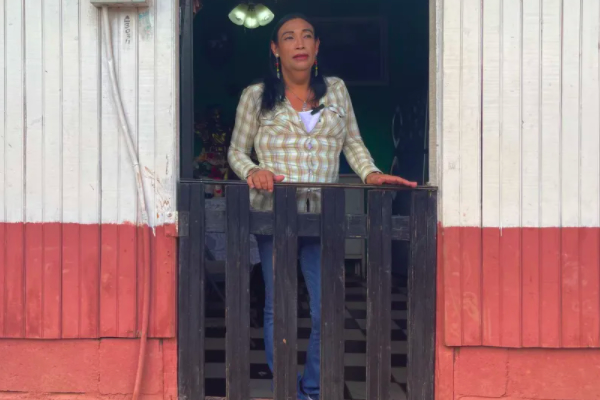World
Arrest made in murder of Honduran transgender activist
Thalía Rodríguez killed in front of Tegucigalpa home on Jan. 10

Authorities in Honduras have arrested a suspected gang member in connection with the murder of a transgender activist.
Reportar sin Miedo, the Washington Blade’s media partner in Honduras, reported the Honduran National Police on Sunday announced agents with its Directorate of Investigations arrested a 28-year-old man for the Jan. 10 murder of Thalía Rodríguez in front of her home in Tegucigalpa, the Honduran capital.
Rodríguez, 58, led Asociación Cozumel Trans, a Honduran trans rights group.
The Honduran National Police in their press release notes the man — known as “Karma” or “Fantasma” — is a member of MS-13.
Reportar sin Miedo reports a court last June issued a warrant for the man’s arrest on weapons charges.
Rodríguez’s murder, which took place 17 days before Vice President Kamala Harris and others attended Honduran President Xiomara Castro’s inauguration in Tegucigalpa, sparked outrage among activists in the Central American country. The U.S. Embassy in Honduras and U.S. Agency for International Development Administrator Samantha Power are among those who condemned Rodríguez’s death.
China
Female writers arrested in Chinese crackdown on gay erotic fiction
Pingping Anan Yongfu arrested last month, detailed ordeal on Weibo

On China’s Weibo, a platform akin to a digital town square, a young woman using the handle Pingping Anan Yongfu laid bare a harrowing ordeal. She was arrested and subjected to a humiliating strip search for publishing gay erotic fiction. Her raw and unsparing account exposed a broader clampdown.
Since February, at least 30 other writers — mostly women in their 20s — have shared similar stories of law enforcement raids, their lives upended for crafting “danmei,” a genre of male-male romance often laced with explicit themes, on Haitang Literature City and other platforms.
”I will never forget it — being escorted to the car in full view,” posted Pingping. “Enduring the humiliation of stripping naked for examination in front of strangers, putting on a vest for photos, sitting in the chair, shaking with fear, my heart pounding.”
A wave of legal limbo engulfs the writers, with many released on bail or awaiting trial, their fates uncertain, according to a BBC. Others remain behind bars, their detention a stark reminder of the crackdown’s reach.
Beyond those arrested, a broader net has been cast: scores of contributors to Haitang Literature City have been hauled in for interrogations, their online words now a potential liability under China’s pornography laws for producing and distributing obscene materials.
China’s pornography laws cast a long shadow over writers, with those profiting from their work facing prison terms exceeding a decade for crafting “explicit descriptions of gay sex or other sexual perversions.” Yet, heterosexual erotica often escapes such scrutiny, slipping through the cracks of enforcement. Nobel Laureate Mo Yan, whose novels brim with graphic sexual scenes, and Jia Pingwa, known for vivid depictions in works like “Abandoned Capital,” and other acclaimed writers continue to publish freely, their books lining shelves without fear of raids. This stark disparity underscores a selective crackdown, where gay erotica bears the brunt of official censure.
Beijing’s unease with the online outcry was palpable, as the trending hashtag #HaitangAuthorsArrested, which amassed more than 30 million views on Weibo, vanished abruptly under censorship’s heavy hand. Posts offering legal advice to the embattled writers were scrubbed, and a detailed report on the crackdown by Caixin, a leading Chinese news outlet, was swiftly taken offline. Writers’ accounts, including some of their pseudonymous handles, have also begun to disappear, erased from the digital landscape as authorities tighten their grip.
As her post ricocheted across China’s digital sphere, Pingping abruptly deleted it, replacing it with a brief message expressing gratitude to supporters while conceding she had broken the law. The admission, tinged with resignation, marked her final act on Weibo before she erased her account entirely, vanishing from the platform amid mounting pressure from authorities.
“Danmei,” a vibrant subgenre of Chinese fiction, centers on romantic and often sexually explicit relationships between men, captivating a largely female readership through its blend of emotional depth, fantasy, and forbidden desire. Rooted in Japanese “yaoi” or “boys’ love,” but distinctly shaped by Chinese cultural sensibilities, it flourishes on Haitang Literature City and JJWXC and other platforms where writers craft sprawling tales of historical, fantastical, or modern love that often laced with themes of power and sacrifice.
Despite its popularity — bolstered by blockbuster adaptations like “The Untamed,” which amassed millions of fans — “danmei” faces intense scrutiny in China, where authorities deem its explicit content “obscene” under vague pornography laws. This tension reflects a broader cultural clash: while “danmei” offers a space for exploring queer identities and challenging traditional gender norms, its underground allure draws both devoted fans and the wary eye of censors seeking to uphold conservative values.
A sweeping crackdown in late 2024 saw Chinese authorities prosecute roughly 50 “danmei” writers, ensnaring them in a legal dragnet under the country’s 2004 obscenity laws. Among them, Yuan Shang Bai Yun Jian, a prominent author who earned 1.85 million yuan ($250,874.58) from her work on Haitang Literature City, was sentenced to nearly five years in prison, her success weaponized as evidence of “obscene materials for profit.”
The harsh penalties, which outstrip those for some violent crimes, sparked outrage online, with netizens decrying the disproportionate punishment for crafting stories that, while explicit, harmed no one.
Chinese media regulator banned ‘danmei’ TV dramas in 2022
Humiliation washed over Pingping as law enforcement stormed into her college classroom, recounted a writer using the Weibo handle “Tianxia Ju Da Bingyuan” or “The World Is a Vast Asylum.” Dragged from her lecture under the stunned gazes of her peers, she endured a public spectacle as officers trailed her to her dormitory, rifling through her belongings in a search for evidence of her “danmei” stories, leaving her exposed and her privacy shattered.
“Danmei” novels, centered on male-male romance have spurred numerous Chinese television dramas, but state censorship has sharply reduced their output. A 2021 Sixth Tone report identified more than 60 “danmei”-based dramas in development or slated for release, involving actors who include Chen Feiyu and Fan Chengcheng. Many of them, however, were halted following the 2022 National Radio and Television Administration ban on such adaptations.
MyDramaList records 16 aired series, including “The Untamed” (2019) and “Word of Honor” (2021), each with 30–50 actors, totaling approximately 480–800 performers. Lead actors, including Xiao Zhan and Wang Yibo, earned $1–3 million per series, per The China Project, while others made $50,000–$100,000, though precise figures remain limited due to private contracts. The 2021 “Internet Clean-up Campaign” and continued restrictions have significantly curbed new “danmei” adaptations.
United Nations
UN Human Rights Council extends LGBTQ rights expert’s mandate
29 countries voted for resolution

The U.N. Human Rights Council on Monday extended the mandate of the United Nations’ independent LGBTQ rights expert for another three years.
The resolution passed with 29 countries (Albania, Belgium, Bolivia, Brazil, Bulgaria, Chile, Colombia, Costa Rica, Cuba, Cyprus, the Czech Republic, the Dominican Republic, France, Georgia, Germany, Iceland, Japan, Kenya, the Marshall Islands, Mexico, the Netherlands, North Macedonia, South Korea, Romania, South Africa, Spain, Switzerland, Thailand, and Vietnam) voting for it and 15 countries (Algeria, Bangladesh, Burundi, China, Cote d’Ivoire, Democratic Republic of Congo, Ethiopia, Gambia, Indonesia, Kuwait, Malawi, Maldives, Morocco, Qatar, and Sudan) voted against it.
Benin, Ghana, and Kyrgyzstan abstained.
The U.S. in February withdrew from the Human Rights Council. The Trump-Pence administration in 2018 pulled the U.S. from it. The U.S. in 2021 regained a seat on the Human Rights Council.
Graeme Reid has been the UN’s independent LGBTQ rights expert since 2023. The South African activist, among other things, previously ran Human Rights Watch’s LGBT Rights Program.

South Africa National Assembly Speaker Thoko Didiza on June 17 swore in lesbian feminist Palomino Jama as a new MP.
Jama joins other LGBTQ legislators — including Public Works and Infrastructure Minister Dean Macpherson; Forestry, Fisheries and the Environment Minister Dion George; and Deputy Women, Youth, and Persons with Disabilities Minister, Steve Letsike.
Jama said she will work hard and excel as MP.
“What a great moment to be alive. Thank you youth of 1976, thank you Simon Nkoli, Phumi Mthetwa, Paddy Nhlaphos, Vanessa Ludwig, and others for what you did for the LGBTI people in the 80s and 90s. Lastly, for the fierce fist of the Jamas to always hit where it matters for the people of this country,” said Letsike.
Embrace Diversity Movement, a local LGBTQ organization, said Jama’s inauguration came at an appropriate time, during Pride month.
“Her swearing-in took place during a month of profound significance in June, which marks both international Pride Month and Youth Month in South Africa,” said the group. “Palomino is a seasoned queer activist and dedicated community builder with a distinguished record of leadership and service.”
“The EDM proudly supports Palomino in her deployment to parliament, her presence meaningfully advances youth and queer representation in public office,” added the Embrace Diversity Movement. “We are confident that she will serve the people of South Africa with integrity, courage, and distinction.”
South Africa is the only African country that constitutionally upholds LGBTQ rights. There are, however, still myriad challenges the LGBTQ community faces on a daily basis that range from physical attacks to online abuse.
Letsike in May faced a barrage of online attacks after she released a scathing statement against popular podcaster Macgyver “MacG” Mukwevho, who during a podcast episode in April insinuated that the reason behind popular socialite Minnie Dlamini’s “unsuccessful” relationships were probably due to the bad odor from her genitals.
Letsike, who viewed MacG’s comments as offensive, called for the podcaster to be summoned before parliament’s Portfolio Committee on Women, Youth, and Persons with Disabilities and criticized the local television station that aired the podcast.
X users and other social media subscribers bombarded Letsike with anti-lesbian comments. She, however, was unphased.
Letsike continues to face anti-lesbian comments, even though MacG apologized and the television station on which his podcast had aired cancelled its contract with him.
-

 U.S. Supreme Court5 days ago
U.S. Supreme Court5 days agoSupreme Court to consider bans on trans athletes in school sports
-

 Out & About5 days ago
Out & About5 days agoCelebrate the Fourth of July the gay way!
-

 Virginia5 days ago
Virginia5 days agoVa. court allows conversion therapy despite law banning it
-

 Opinions5 days ago
Opinions5 days agoCommunity comes together to repair WorldPride history exhibition












